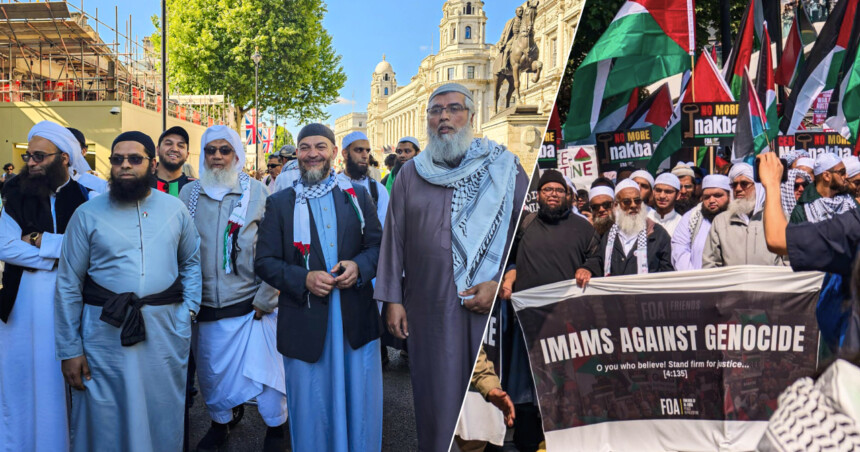
In the name of Allah, may His peace and blessings be upon His final Messenger, Muhammad, his family, and his companions.
On 17 May 2025, I had the honour of attending the national demonstration in London marking the 77th anniversary of the Nakba.
The crowd, though underreported by mainstream outlets like the BBC, easily numbered in the hundreds of thousands. This alone is an affirmation that the Palestinian cause is alive in people’s hearts.
BACKGROUND
- Saturday, 17 May 2025 marked the 77th anniversary of the Palestinian Catastrophe or Nakba
- A demonstration marking the day drew hundreds of thousands to the streets of London, marching from Embankment to Downing Street
- Across the globe, many similar protests were held, from Germany to Sweden, Greece to Switzerland, and from Canada to the United States
- In the past week, the British government has changed its tune when referring to the Zionist state, cancelling trade talks and condemning the aggression in Gaza
- A number of European states are increasingly looking set to recognise Palestinian statehood in the coming weeks
One striking observation was the sheer number of Muslims present — many in traditional Islamic dress. This is a sign of a significant shift in the mindset of British Muslims, a growing confidence in combining British and Islamic identities, and a commitment to turning knowledge into civic action.
And there were many Imams and scholars among the crowd, this was very good to see.
In fact, Allah (subḥānahu wa ta’āla) condemned the scholars who fail to speak the truth or warn against evil due to their silence or complicity.
Allah says,
Why do the rabbis and religious scholars not forbid them from saying what is sinful and devouring what is unlawful? How wretched is what they have been practising!” [1]
Scholars are beginning to see their role beyond the legal sense, moving toward embodying the higher objectives of Islam — chief among them, justice.
This transformation is something we should all celebrate and thank Allah for. This is what He commanded the people of knowledge to do: act upon knowledge and be in front to call people to Him.
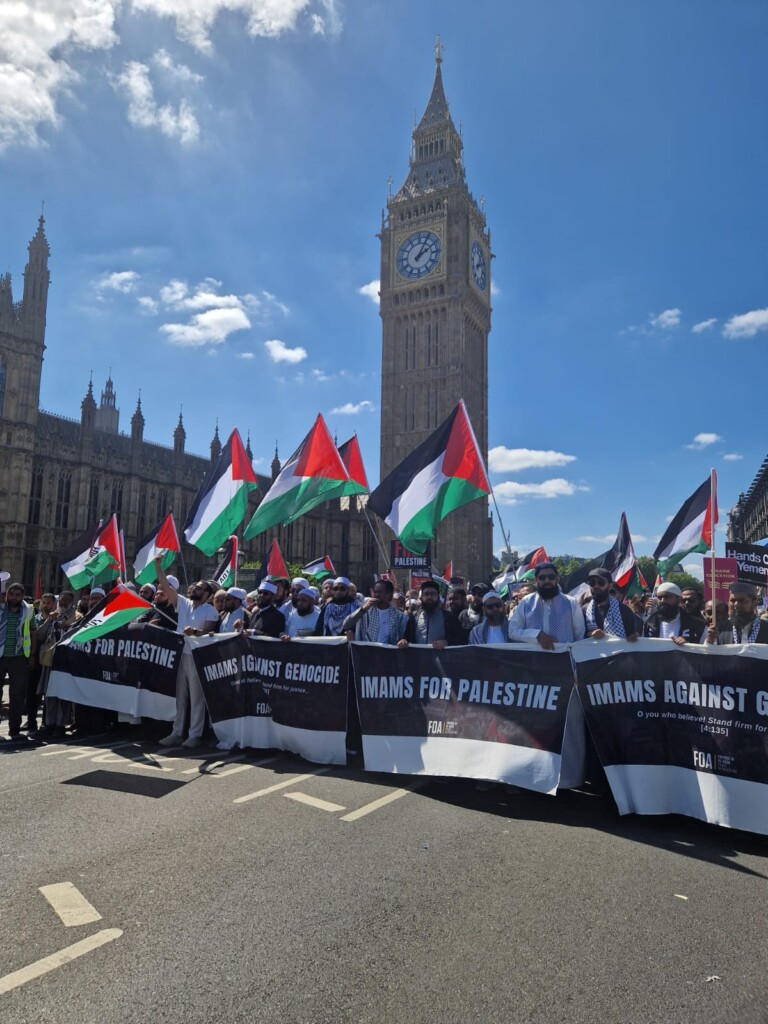
Power and principle of demonstration
Attending demonstrations should be understood from a macro perspective.
They are among the most civilised and effective means to express objection — whether locally or internationally. They serve as both a pressure mechanism and a safeguard against the misuse of governmental power.
When governments operate without resistance or objection, they are far more likely to slip into corruption, injustice, and tyranny. Power, as the adage goes, breeds corruption.
It is unfortunate, yet telling, that it is mainly Western societies that have understood this dynamic and incorporated protest into their civil framework. It is considered a right — an essential tool to maintain the balance between authority and the people.
Meanwhile, in many Muslim countries, this understanding has either not matured or been deliberately suppressed. Demonstrations are heavily controlled or outright banned.
Worse still, religious authorities are often exploited to delegitimise public dissent, branding it as “un-Islamic”. But the very fact that authoritarian regimes fear and suppress demonstrations is testimony to their potential power. It shows that public resistance, even if peaceful, can destabilise tyranny.
As Muslims, we should be the most active people in prohibiting any act of injustice or indecency. Allah chose us as the best of nations due to this reason despite the disparity of everything else; race, colour, background, etc.
Allah (subḥānahu wa ta’āla) says,
You are the best nation produced [as an example] for mankind. You enjoin what is right and forbid what is wrong and believe in Allah.
If only the People of the Scripture had believed, it would have been better for them. Among them are believers, but most of them are defiantly disobedient.” [2]
In fact, Islam made activism as a personal obligation as Allah knows that it is the only way for humanity to counter injustice, indecency, and corruption.
The Prophet ﷺ said,
Whosoever of you sees an evil, let him change it with his hand; and if he is not able to do so, then [let him change it] with his tongue; and if he is not able to do so, then with his heart — and that is the weakest of faith.” [3]
Allah also says,
Let there arise out of you a group of people inviting to all that is good, enjoining what is right, and forbidding what is wrong. And it is they who will be successful.” [4]
Rise of global consciousness
Since the beginning of the genocide in Gaza, the world has witnessed mass demonstrations in nearly every corner of the globe, with a seismic shift in awareness.
The brutality of the Zionist regime has shocked many into speaking out, and these demonstrations have played a major role in moving the moral compass of the global community.
Two years ago, publicly criticising Israel or Zionism was seen as taboo. Today, because of the relentless activism and courage of ordinary people, these boundaries are being dismantled. The Palestinian narrative is continually gaining prominence, and this is a triumph of both politics and moral clarity.
This civil activism has brought about tangible change. We have seen academic institutions, political leaders, and even governments begin to alter their stances. Countries such as Spain, Belgium, Norway, and Ireland have shown shifts in political posture. The voices of conscience are growing louder.
In a recent example, a British Conservative MP stood in Parliament and called on the UK to acknowledge its historical injustices against Palestinians and stand on the right side of history. Such statements would have been unthinkable just a short time ago.
This activism has also led to increasing numbers of people embracing Islam or at least appreciating it.
Some stories from those I engaged with
Some of the most touching moments came from the people I met.
Whole families — Muslim and non-Muslim — joined the march. I saw parents pushing strollers and elderly women walking with difficulty. One woman in her 80s told me she cries every time she sees what’s happening in Gaza. A man in his 70s, limping and tired, said he had attended every Palestine protest for decades.
We as Muslims are invited to rethink our relationship with the wider non-Muslim community. We may not realise it, but many among them are still upon their fitrah — their natural disposition toward justice.
Allah (jalla wa ‘ala) says,
So direct your face [i.e. self] toward the religion, inclining to truth.
[Adhere to] the fitrah of Allah, upon which He has created [all] people. No change should there be in the creation of Allah. That is the correct religion, but most of the people do not know.” [5]
It is time we work together for the betterment of all societies. Importantly, we must distinguish between governments and the general public. Many ordinary people are deeply committed to justice, even if their governments are not.
Allah commanded us to work together, irrespective of our religion, towards goodness and the alienation of evil and indecency.
He says,
And co-operate in righteousness and piety, but do not co-operate in sin and aggression. And fear Allah; indeed, Allah is severe in penalty.” [6]
Zionist moral high ground has been lost
During the march, we passed a small counter-demonstration in support of Israel. It was shockingly small. I noticed a few individuals holding Indian flags alongside Israeli ones.
Reflecting on this contrast — hundreds of thousands marching for Palestine, versus a tiny group for Israel — showed that Israel has long lost the moral high ground.
At the same time, I saw Indian flags and symbols of Hindu and Sikh communities among the pro-Palestinian side, as well as Christian and socialist groups.
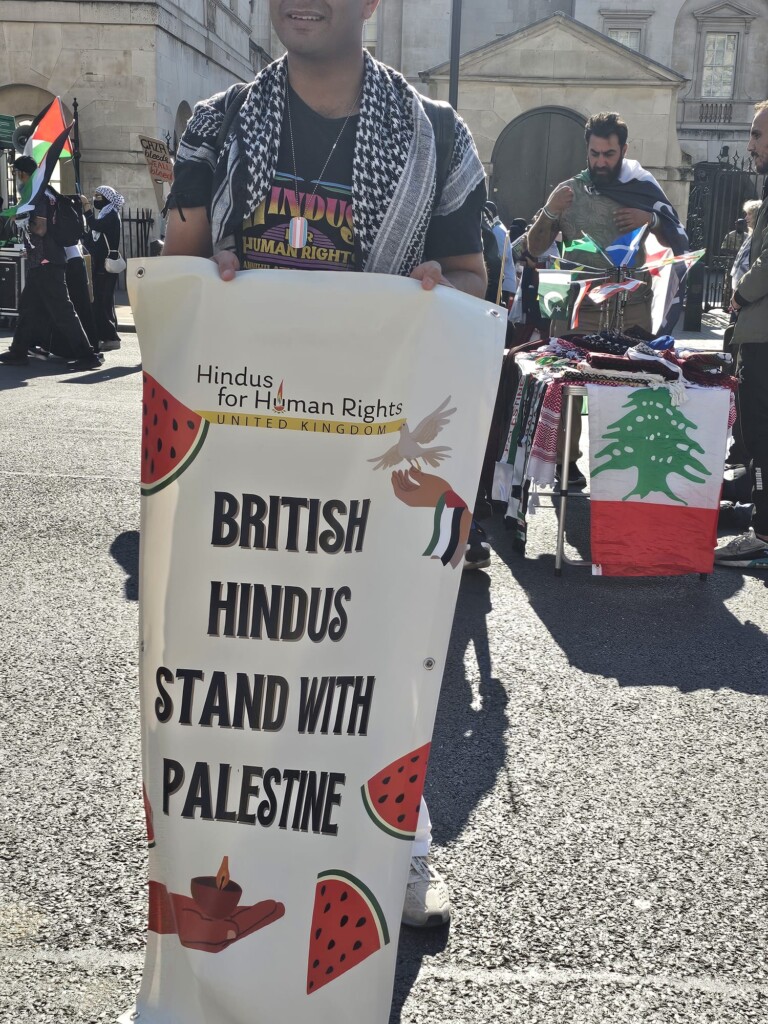
Jewish representation
Equally significant was the presence of Jewish voices in the demonstration.
Orthodox Jews holding banners against Zionism have become familiar, but this time I noticed a new organisation: Israelis Against Genocide. When those raised in a Zionist society begin to reject its crimes, the world must pay attention!
This proves that opposition to Israel is not anti-Semitic — it is anti-oppression. And it reaffirms an Islamic truth: we can coexist with Jews, as we did historically under the Prophet ﷺ in Madina and throughout the Muslim world.
While we believe that Judaism, in its current form, has diverged from the original revelation to Mūsā (ʿalayhi al-Salām), this theological disagreement never prevented peaceful coexistence. In fact, Muslim lands were among the safest for Jews historically. Let this remind us of the human common ground we share.
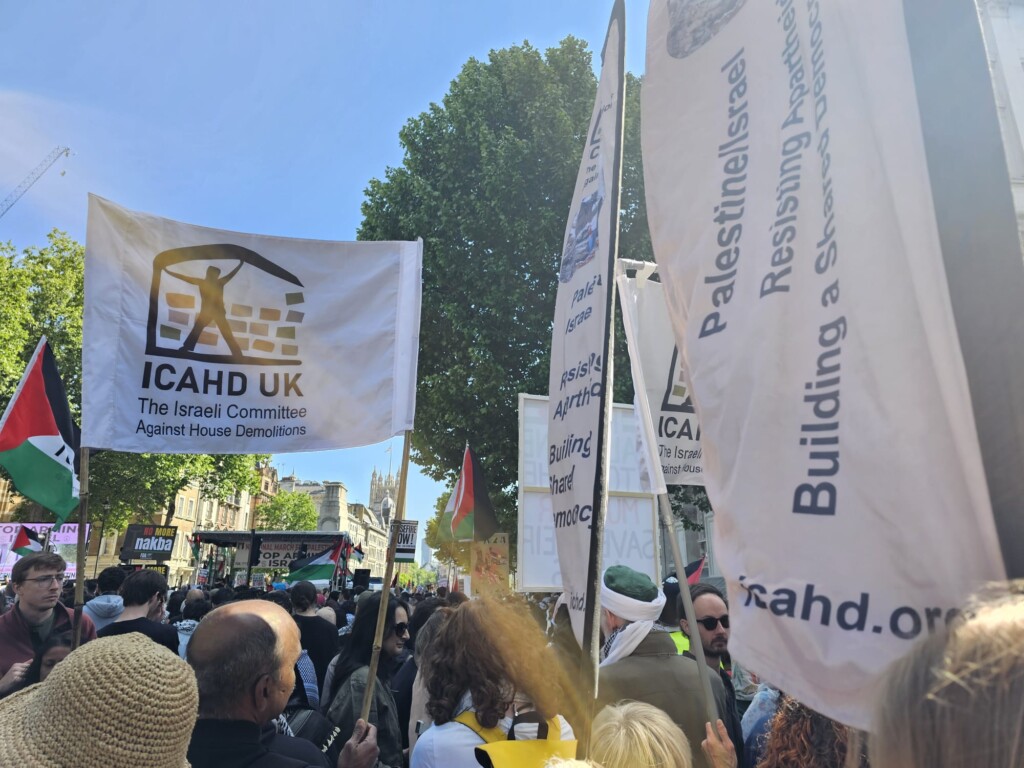
Hope is never lost
Lastly, and perhaps most powerfully, I was struck by the scene of hundreds of Muslims stopping to pray during the protest, in the middle of central London, with the sound of protest all around. This was a major īmān booster.
It reminded me that truth is alive, and hope is not lost. Islam teaches us to remain hopeful, even in adversity.
The Prophet ﷺ never gave up hope. When Khabbāb ibn al-Aratt and others came to him under persecution, he responded with patience and promises of Allah’s support and eventual victory. He (ﷺ) gave hope to Surāqah during Hijrah, and he saw victory even during the Siege of Khandaq.
In our time, these demonstrations carry the same message: that despite the odds, we believe in the promise of Allah, and we are inspired to remain firm.
And I am confident that the people of Gaza, and Muslims around the world, are inspired when they see these images. They know they are not alone. This spirit will continue to motivate resistance, and it will remind all of us: never give up on the truth.
May Allah continue to guide us, keep us firm, and unite our hearts in the cause of truth. Āmīn.
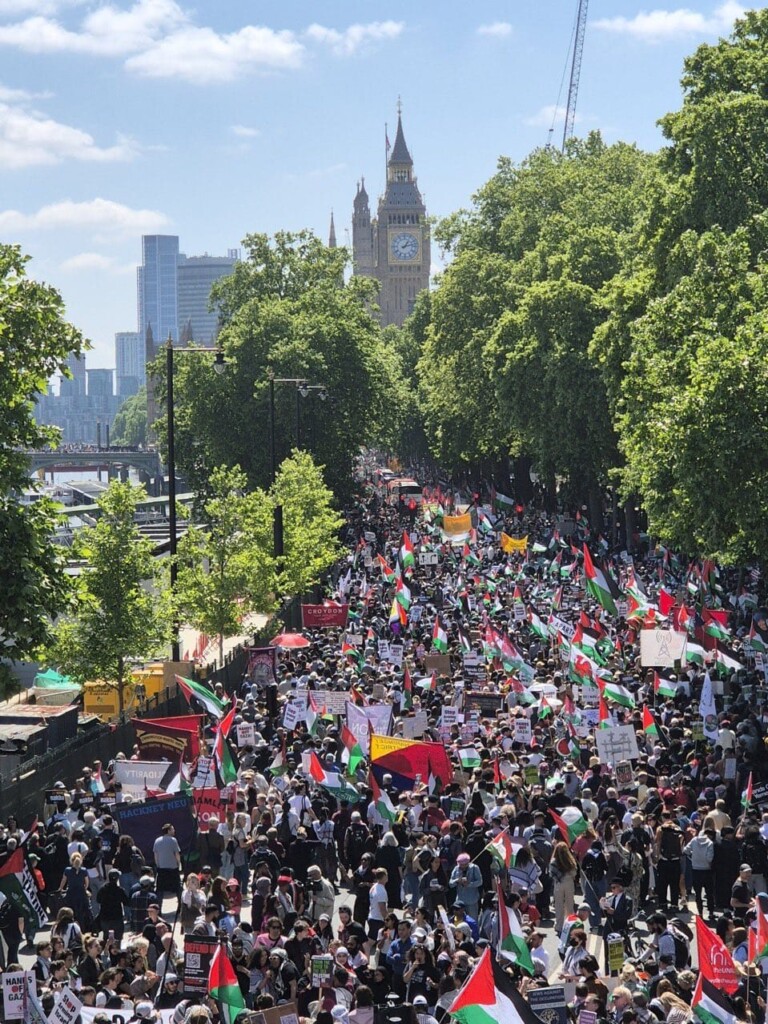
Source: Islam21c
Notes
[1] al-Qur’ān, 5:63
[2] al-Qur’ān, 3:110
[3] Sahīh Muslim; https://sunnah.com/muslim:49a
[4] al-Qur’ān, 3:104
[5] al-Qur’ān, 30:30
]6[ al-Qur’ān, 5:2


